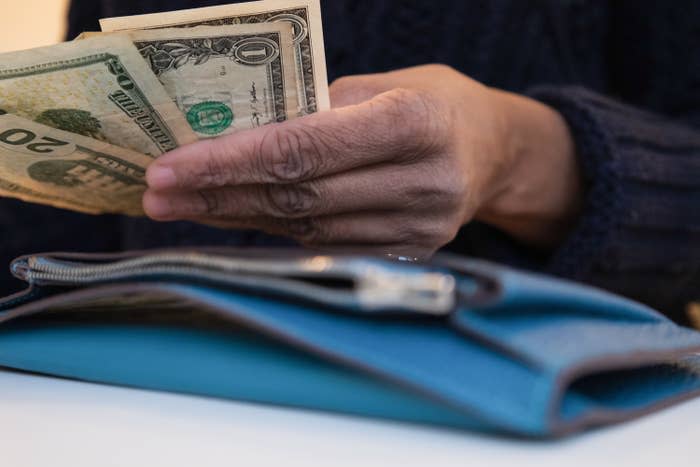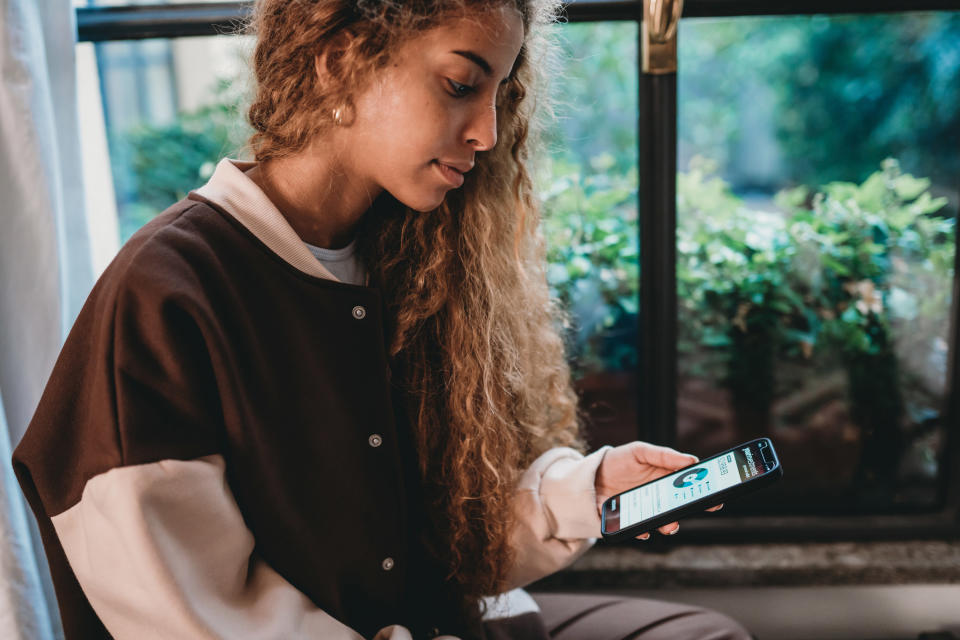Someone Asked The Internet, "What's An Easy Way To Save Money?" — And People Delivered Genuinely Helpful Answers
With inflation and most people living paycheck to paycheck, it feels nearly impossible to manage finances — let alone save money.

But if you are currently looking to get a better grasp of your finances and have the ability to save money, you can check out these money tips and hacks from Reddit user u/halal_queries_only's thread where they asked: "What's an easy way to save money?"

While saving money is not exactly an easy thing to do in today's climate (or really any climate), hopefully, some of the below tips might be useful for your current lifestyle.
1."If your job does direct deposit, one easy way to save is to open a savings account where a certain amount of your direct deposit is automatically put in for you. It’s like out of sight, out of mind (for me at least)."

2."Open a notice account, one where you don't have access to your money without giving a month's notice. And transfer some in every payday."
3."Learn how to cook. ('But I don't know how to cook.') Cooking is literally just following instructions. There are YouTube videos or websites that can spell out everything you need."

"Learn the science behind cooking, too. Learn the basics, like how to make some of the mother sauces."
"Legit question: Since cooking often involves inefficient heating furnaces, ovens, open pots, and pans instead of microwaving, buying ingredients, and using all kinds of equipment, is it really cheaper compared to putting frozen meals in the microwave, including the price of said meals, of course.
It's more interesting to learn how to cook, but it seems some aspects of it can still be quite costly."
"Short answer: yes
Long answer: the initial cost of buying the pots, pans, and spices is high, but you reuse that same equipment for the entirety of your cooking life and a lot of the spices are reused in different meals. They last a long time, too, and vegetables/rice are usually incredibly cheap.
The majority of the cost comes from purchasing raw meat. In most of my recipes, the cost of the meat is equal to the cost of every other ingredient combined, and even then the meat costs more. So yeah, it's still way cheaper to learn how to cook than to buy microwave dinners. You just have to learn the recipes that make lots of food."
4."Buy in bulk and freeze your meat. I just got eight pounds of ground beef and 10 chicken breasts for $15 each. That's about 40 meals worth of meat for $30."
5."Don’t check out immediately when you're online shopping. Let an item sit in your cart for a few days, then decide if you really need/want it."

"And while it's there, make sure to read the one-star reviews.
A lot of times it will help talk you out of buying it or show you a way to do the same thing cheaper."
6."Live in your parents' house."
7."Pay in cash. Don't carry any with you so you actually have to go and get it then go back. I guarantee you'll think more than twice."

"While the sentiment is good. I would push back and say: Never ever pay in cash if you don't have to.'
Paying in cash is what subsidizes credit card users and their perks. Much better to treat a credit card as a debit card (i.e. only spend what you have). Or even some debit cards have small perks.
It takes discipline, but you can maximize return. There are free (no yearly fee) credit cards with unlimited 2% back on everything. If you treat it like a debit card, that's 2% more money than you previously would've had."
8."Don’t save what is left after spending but rather spend what is left after saving. In other words, pay yourself first."
9."When buying furniture, either buy used or buy 'scratch and dent' from the store, when people refuse the delivery because of damage. If it's minor, they generally mark down the price over half off. For example, a $1,300 couch becomes a $550 couch with a minor scratch on it."

10."When you get a pay raise, add that to the amount you're saving already. Just don't increase your expenses accordingly."
11."Set up a separate savings account and have 20% of your paycheck automatically deposited. I had to do this three years ago, as it was the only way I would save. That account is now up to almost $30K. It's growing slower than I expected, but unlike my 401K it's after-tax money."

"HAHAHAHAHAHAHAHA like I can afford to let 20% get saved. Y'all must get paid pretty well."
"When I started, I was only making like $35K per year — now I'm up to $60K. So barely in the 25th percentile to now more like the 45th percentile.
It was tough at first, but once I prioritized my budget, it became a lot easier. I started only buying necessities (rent first, then utilities/phone bill, then food), and then if I had leftover money, I would buy things that weren't a priority. I quickly learned that things that weren't a priority were pretty easy to live without, which was good because there wasn't a lot of wiggle room in the budget.
As I started making more money, I was able to put more into savings as my costs didn't increase as much as my income."
12."Write down everything you spend money on, everything. It makes you more aware of where it goes and what little things actually add up."
"I did this for two years until I got a good feel for my income and spending habits and it worked well.
Google Sheets has a great budget template. You can enter your monthly earnings, monthly expected expenses in every category, and then actual expenses in every category. That way you can see what you thought you'd spend compared to what you actually did. It's a really helpful way to visualize your spending."
13."Drop alcohol."

"I used to be part owner in a restaurant. I’m not exaggerating when I say that those $30 bottles of wine literally cost the restaurant $7. Also, liquor is $10–15 a shot from a $20 bottle that I can get 20 shots from."
14."Buy non-immediate things off-season or times with a super sale. For example, need new boots but can wait until after this winter season? Buy them in March when they are 50% off. The same thing with summer clothes: buy them in September when it’s discounted."
15."Separate bank accounts for separate purposes. It seems silly, but it works. Between my wife and I, we have four separate checking accounts at three different banks. One is our joint account for everyday spending/variable expenses (i.e. groceries, gas, etc), one is a joint account that is only used for debt services and recurring expenses (i.e. mortgage, car payment, etc), and then we each have our own checking accounts for our own money. The way I manage it is that I have a certain amount deposited each week into each account directly through payroll so there is no manual transfer. This way, there's never a possibility of coming up short."

16."Three things that helped: 1) Think about what percentage of your monthly income goes for rent and bills. Divide the rest by 30 so you know roughly how much your daily spending should be. When (not if) you go over that limit, you can balance things by spending the next one to three days less so you get back on track. You'll be surprised how much this helps in the long run."
2) Don't try to save money. Instead, take a notepad and divide one page into three columns based on importance. First is mandatory (rent, bills), second is preferred (things that you want to have in your life), third is optional (as an example: think of the subscriptions you don't use but still pay for because you 'might need them at some point.' Netflix was a good one for me.)
3) After you've done that, ask two of your friends to make a similar list based on their spending habits and needs (even better if you guys have roughly the same income). Compare the lists and discuss them. This helped me realize several things about my spending habits and helped me clear some of my unnecessary spending."
17."Eliminate food waste. Don't let leftovers go bad. You can repurpose them into something different if you get tired of them or freeze them if they are freezer-friendly. Use your food scraps (save vegetable scraps for vegetable broth, rotisserie chicken carcass for chicken broth apple peels for apple cider vinegar, etc). Freeze the ends of bread for croutons, stuffing, etc. Store food properly to keep it fresher longer (particularly vegetables). Don’t automatically throw out food that is past its best-buy date because it doesn’t necessarily mean it's bad, especially for things like yogurt, sour cream, creamer, etc."

18.If your bank offers it, sign up for a program that rounds up your purchases and deposits the extra into a separate savings account. My bank offers this with debit purchases. Sure, it's only 45 cents here, 71 cents there, but it adds up over time, and it is very easy because I don't have to change the way I do my shopping."
19."Don't lease or buy a new car every three to five years. Buy a reliable one with a low-interest loan, pay it off, and drive it as long as possible."

"You should be able to get close to 250,000 miles on most modern cars, barring any major accident or catastrophic failure.
Cars depreciate the most in the first few years, so buy a lightly used one if it makes sense for you. Some banks charge higher interest on used car loans, so take that into account."